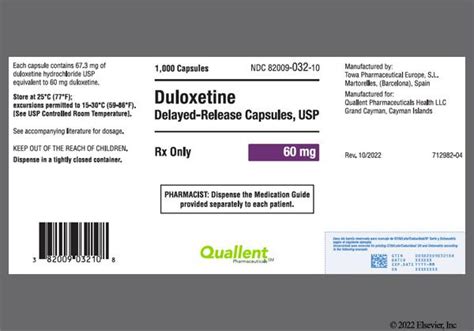Intro
Duloxetine DR 20mg capsule treats depression, anxiety, and fibromyalgia, offering relief from chronic pain and neuropathic symptoms with its antidepressant properties.
Duloxetine, a serotonin-norepinephrine reuptake inhibitor (SNRI), is a medication used to treat various conditions, including major depressive disorder, generalized anxiety disorder, fibromyalgia, and neuropathic pain. The duloxetine DR 20mg capsule is a specific formulation of this medication, designed to provide a delayed release of the active ingredient. Understanding the details of this medication is crucial for patients who have been prescribed it, as well as for healthcare providers looking to offer the best possible care.
The importance of duloxetine and its formulations, such as the duloxetine DR 20mg capsule, lies in their ability to manage symptoms that significantly impact an individual's quality of life. Conditions like depression and anxiety are not just emotional challenges but can also have physical manifestations, making treatment complex. The duloxetine DR 20mg capsule, with its delayed-release mechanism, is designed to provide a steady and consistent level of the medication in the bloodstream, which can help in maintaining therapeutic effects over a longer period.
For patients, understanding how medications like duloxetine work and what to expect from treatment is vital. This includes knowing the potential benefits, such as improved mood, reduced anxiety, and better management of pain, as well as being aware of possible side effects. The duloxetine DR 20mg capsule, like other formulations of duloxetine, can cause side effects, some of which may be more common or severe than others. Common side effects include nausea, dry mouth, and dizziness, while more severe side effects can include increased risk of bleeding, serotonin syndrome, and allergic reactions. It's essential for patients to discuss these aspects with their healthcare provider to ensure they are making informed decisions about their treatment.
What is Duloxetine?

How Does Duloxetine Work?
The mechanism of action of duloxetine involves the inhibition of the reuptake of serotonin and norepinephrine by binding to their respective transporters. This action increases the concentration of these neurotransmitters in the synaptic cleft, the gap between two neurons, enhancing neurotransmission. The increased levels of serotonin and norepinephrine contribute to the therapeutic effects of duloxetine, including improved mood, reduced anxiety, and enhanced pain tolerance.Benefits of Duloxetine DR 20mg Capsule

Potential Side Effects
While duloxetine can be an effective treatment for many conditions, it's not without potential side effects. Common side effects include: - Nausea and vomiting - Dry mouth - Dizziness - Sleep disturbances - Increased sweating More severe side effects, though less common, can include: - Increased risk of bleeding - Serotonin syndrome (a potentially life-threatening condition caused by too much serotonin in the body) - Allergic reactions It's crucial for patients to discuss any concerns or side effects with their healthcare provider, as adjustments to the treatment plan may be necessary.Steps to Take Duloxetine DR 20mg Capsule

Precautions and Warnings
Before starting duloxetine, patients should be aware of the following precautions and warnings: - **Allergic Reactions:** If you have ever had an allergic reaction to duloxetine or any of its ingredients, you should not take this medication. - **Pregnancy and Breastfeeding:** Duloxetine may pose risks during pregnancy and breastfeeding. Women who are pregnant, planning to become pregnant, or breastfeeding should discuss these risks with their healthcare provider. - **Interactions with Other Medications:** Duloxetine can interact with other medications, including certain antidepressants, leading to serious side effects. A comprehensive list of your current medications should be provided to your healthcare provider.FAQs About Duloxetine DR 20mg Capsule

What is the most common side effect of duloxetine?
+Nausea is one of the most common side effects of duloxetine, especially when first starting the medication.
Can I stop taking duloxetine whenever I feel better?
+No, it's important to continue taking duloxetine as directed by your healthcare provider. Stopping the medication abruptly can lead to withdrawal symptoms.
Is duloxetine addictive?
+Duloxetine is not considered addictive. However, like many antidepressants, it can cause withdrawal symptoms if stopped too quickly.
In conclusion, the duloxetine DR 20mg capsule is a valuable treatment option for various conditions, including major depressive disorder, generalized anxiety disorder, and certain types of pain. By understanding how duloxetine works, its benefits, potential side effects, and proper administration, patients can make informed decisions about their treatment. It's essential for patients to maintain open communication with their healthcare provider to ensure the best possible outcomes. We invite readers to share their experiences or ask questions about duloxetine and its use, contributing to a community of support and information sharing.
